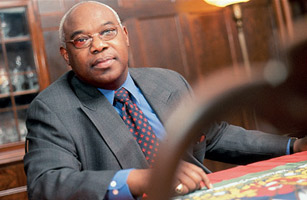
The activist and economic develpoer, who grew up in Haiti and in Brooklyn, N.Y., is creating a computer database to unify the Haitian-American vote.
Jean Vernet II
Corpses have their own body language. Jean Vernet II's memories of Haiti under the dictatorial rule of Jean (Papa Doc) Duvalier are written in the patois of the murdered, and even today, decades later, the images of twisted limbs and fallen forms haunt him — and remind him of what can happen when ordinary people have no voice.
"To disagree with Duvalier meant death. The chaos he created still stifles Haitian life," says Vernet, 49, a Haitian-American activist. In 1968 Vernet and his family fled Haiti and moved to New York City. In the aftermath of the rebel takeover of the Haitian government earlier this year, Vernet is seeking to sponsor democracy in his mother country by championing political participation in the U.S. Haitians make up one of the largest immigrant groups in New York City without a City Council member from its ranks. Vernet's organization, Initiatives Democratiques, has set up voter-registration drives in New York in an attempt to create a Haitian-American voting bloc, and he is compiling a computer database of Haitian-American voters in the U.S. The average annual per capita income in Haiti is just $440, a figure supplemented by many Haitian Americans who send a portion of their wages to relatives back home. Vernet, whose resumé includes an unsuccessful run for the New York City Council in 2001, argues that because of those financial links, increasing the political and economic fortunes of Haitian Americans will have an impact in Haiti.
Initiatives Democratiques is planning a campaign to encourage more immigrants to become U.S. citizens by running a series of newspaper and television ads that, starting in September, will target New York City's 200,000 Haitians, some of whom are undocumented day laborers. "We are no longer a quasi-exile community who will return to Haiti shortly," Vernet says. "It is O.K. to be American."